We are launching the Papua New Guinea Election Results Database in Port Moresby today. The database contains all available election results for all general elections held in Papua New Guinea since 1972. The database is our attempt to preserve Papua New Guinea’s electoral record and to share it with researchers, as well as people from Papua New Guinea who want to know more about the electoral history of their constituency, region, or country.
If you are interested in a result from a particular constituency in a particular year you can find it using the database’s Data Explorer. If you want booklets of results you can download them from the Datasets page. And if you want to conduct your own analysis you download results spreadsheets from the same page. There are also other features including an electorate map and a detailed report on electoral trends.
To launch the PNG Election Results Database online we wanted to provide you with some basics. Here are five key points you should know about election results in Papua New Guinea.
Point 1: Candidate numbers have gone up
The chart below covers every general election since 1977. For each election it shows the number of candidates in the electorate with the most candidates, the number of candidates in the median electorate, and the number of candidates in the electorate with the least candidates. All of the lines are trending upwards. Candidate numbers are on the rise, on average, in PNG. Indeed, in the busiest electorates candidate numbers are astounding. Seventy-three candidates stood in Chimbu Provincial constituency in 2012 and there were 13 constituencies in 2012 where more than 50 candidates stood.
Trends in candidate numbers
Point 2: Winning candidate vote shares have come down – to a point
The next chart shows trends in maximum, median and minimum winning candidate vote shares over time. Initially at least, winner vote shares came down (one candidate won his electorate with 6 per cent of the vote in 2002). The decline in winning candidate vote shares was arrested in 2007 with the introduction of Limited Preferential Voting. However, it is hard to look at the chart and argue that this new voting system has completely transformed election results. In 2012 one candidate was able to win with 15 per cent of the vote, even after preference allocations. And about half of the winning candidates in 2012 won with 30 per cent or less of the votes cast, even taking preferences into account.
Trends in winning candidate vote shares
Point 3: There are no clear trends in incumbent turnover rates
With more candidates contesting one might expect sitting MPs to be having an increasingly difficult time holding onto their seats. This hasn’t been the case. Incumbent MPs don’t have it easy. In most elections about half of them have lost. But while, as the chart below shows, turnover rates have bounced around, there’s no clear trend towards greater turnover. Of course, 50 per cent is still high. It suggests discontented voters. It also means that at any point in time half the members in parliament are new to politics. In the 2012 parliament, only about 20 per cent of MPs had two or more previous terms’ experience.
Percentage of incumbents who contested and won or lost
Point 4: There is a lot of variation
Key electoral features differ a lot between different parts of Papua New Guinea. Some of these differences are regional—on average incumbent turnover rates are lower, candidate numbers are lower, and winners win with higher vote shares in the Islands region. However, even within regions there can be a lot of variation. Indeed, there can be a lot of variation within the same province as can be seen in the next chart, which shows the number of candidates standing in the different electorates in Enga Province in 2012. These are neighbouring electorates, but in terms of candidate numbers at least, in 2012 they had very different elections.
Candidate numbers in Enga Province constituencies in the 2012 election
Point 5: The playing field is unfairly tilted against women candidates
Most of the time access to money is crucial in electoral campaigns in PNG. Most of the time having influential community leaders supporting you is important in electoral campaigns in PNG. Often voters, other than close relatives, will only vote for a candidate if they think they are likely to win. Women candidates usually suffer in all of these areas in PNG. Women usually have less money than men. It is harder for women to gain the support from community leaders who are usually men. And because PNG does not have a long history of successful women candidates, it is probably the case that voters often discount the chances of existing candidates and don’t vote for them. These challenges are compounded in instances by issues such as gendered norms of how women are expected to behave. Taken together all of this makes it very hard for women candidates to win. The results of this can be seen in the figure below. Papua New Guinea does not lack for strong, intelligent aspiring women politicians, and hopefully they will be increasingly successful in winning elections. But for now they aren’t contesting on an equal playing field.
Number of successful women candidates in PNG, by election
These are five key facts for you. There is much more to be discovered if you want to work with the data in the database.
Terence Wood is a Research Fellow at the Development Policy Centre. Terence’s research interests include aid policy, the politics of aid, and governance in developing countries.


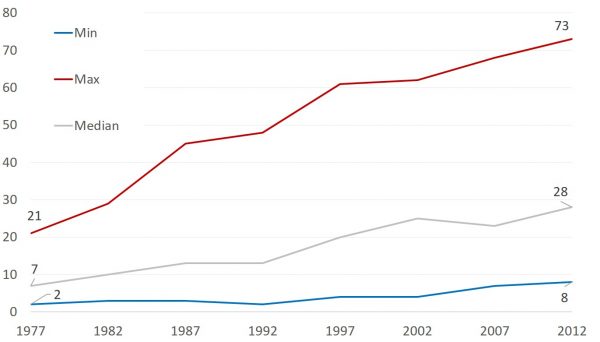
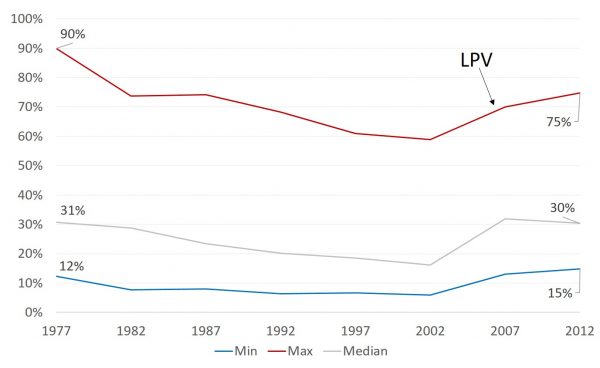
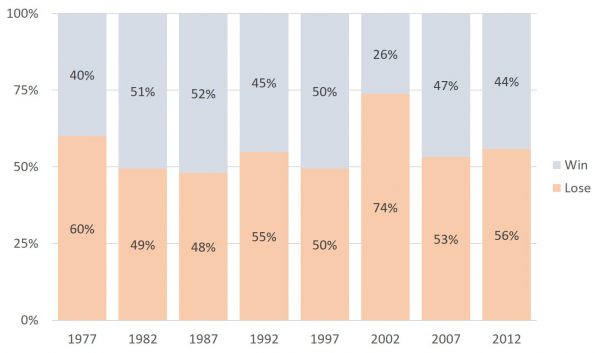
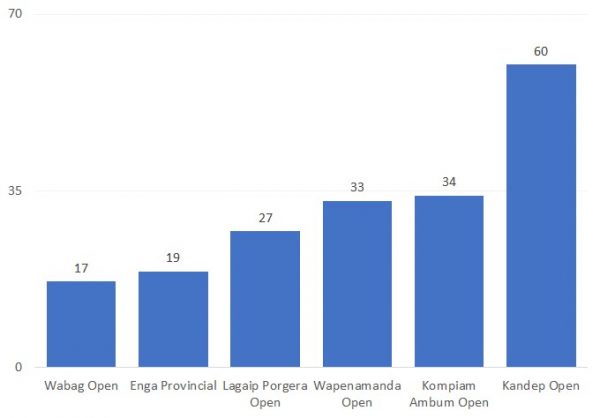
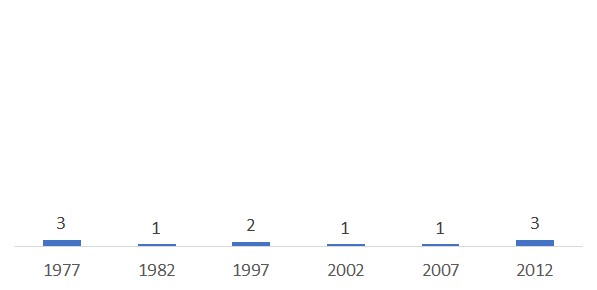

Mr Wood, thank you for your great work. These database are really helpful as I know these will help me for my election campaigns. And one query: in the database that you’ve provided for each electorate and their number of contestants plus how much votes they’ve collected from 1977 to 2017 elections, can you also provide details how much votes a candidate collected in each of the polling venues? I mean the how a candidate has collected in each of the Rest Houses in all the electorates? I think this will really help us and we look forward to hearing from you soonest. Regards!
Thank you Bill,
I don’t have polling station results. They’re not usually published. I think this is to preserve voter anonymity.
Thank you for your comment.
Terence
Thank You Terence, now I know my electorate Moresby North west electoral information since 1972- 2017
You’re welcome Dairi, I’m really glad to hear the information has been useful.
Terence
Member Elect for Moresby North West is : Honourable Lohia Boe Samuel – Total votes of 12,185. For your information.
Hi Dairi,
Thank you very much for the update.
Kind regards
Terence
Where can i find election results for 2017.
Hi Elizah, you can find the results on our interactive data explorer here.
You can download a pdf book of all election results here.
You can download a spreadsheet of all election results here.
Terence
Sir thank you for your research into PNG Political Governance History. It has shed light into many unknown and unrecorded history of our country PNG.
Please, I need a copy of election report of 1972.
Thank you Mr. Terence I find your information very helpful and relevant and it has helped me to complete my assessment Task. However, I would like to make a suggestion here that if you could update your information by giving us a total figure of participating candidates from each provinces with respect to their genders.
Hi Yang,
The data can be found in the database itself (for the years 2007, 2012 & 2017). We don’t have information for earlier years unfortunately. You can access the database from the website:https://devpolicy.org/pngelections/datasets/
The number of candidates by gender for each province for 2017 & 2012 can be downloaded at:
https://devpolicy.org/wp-content/uploads/2020/08/2012-and-17-cands-by-prov-by-gender.xlsx
Terence
Thanks for information about PNG election
Update on referendum in arob.
I just checked into this PNG electoral commissions database. I believe you also must have assessed the cost factor for the overall elections since 2002. Meaning, that if you have any, the cost of elections specified. Each respective election years can be also included in the database. That would help the Government to make key financial decisions on future election preparations.
H Joe,
Thanks for your comment. This type of information is, as you say, very important, but the database focuses on election results, meaning it isn’t quite it’s area.
If you (or anyone else who is interested) want to learn about election costs you can get some information from the 2018 evaluation of Australian electoral assistance:
https://dfat.gov.au/about-us/publications/Documents/evaluation-of-australias-electoral-assistance-to-png-2015-17.pdf
Also, this earlier evaluation has some excellent cost information:
https://dfat.gov.au/about-us/publications/Pages/independent-evaluation-of-australian-electoral-assistance-in-papua-new-guinea-2000-2012.aspx
Finally, the PNGEC’s post 2017 report on the elections also has very in depth and useful information, although I do not know if a final version of the report has been published.
Thanks again for your comment.
Terence
Great information. Can you provide the 2007 and 2017 election results?
Looking forward to 2017 results.
If possible can you provide the stats of how many MPs switch from one party to another between a parliamentary term?
Hi Michael,
That’s a very good question — and a very interesting part of PNG politics. Unfortunately, I don’t have those statistics. I would love to gather them in the future though. In the meantime you could use the database and compare the parties that MPs were elected under in 2007 with those that they stood under in 2012 — this would give you some sense of party changes mid-term, although it would not be ideal.
Terence
Hi again Michael,
On 2017 results — I am still trying to get these. I hope I might have them sometime soon. But I am not sure of this.
Kind regards
Terence
Thank you so much for your work. It is a must have source of reference for students, researchers and public here in PNG. Cheers! I’ve adapted your datasets for private and public presentations where I have acknowledged my primary source of data.
With appreciation.
Thank you.
Henry Boas Kopapa
Terry you’re a legend for this program. You are actually doing this program for png’s general populations as well as research purposes. Thank you so much historian.
Thank you Jerry, I really appreciate the comment.
Terence
i require post poll verdict in karema region in png
Thank you Terence for this wonderful tool for shaping public policy and planning etc – something I think the electoral commission Office of Political Parties can’t do without. I do note your Point 5 on women participation in national election and they are spot on. While 165 women are recorded for 2017 nationally,looking at the interest rate for each provinces for 2017 Chimbu(11) EHP(13)East Sepik(11)Madang(14)Morobe(13) Central (14) Gulf(12)NDC(13) I am wondering what could be the underlying factors in these high numbers?,Could they be Education, Cultural(Matrilineal /Patrilineal) Better awareness?
Thank you Gerard, those are very good questions. My hope is that reseachers from PNG can take their own knowledge of the country and combine it with the information in the database to provide answers to important questions like the ones you raise.
Terence
Thank you Terence for the analysis and the data base as well. As alluded to by Bal, its definitely a worthwhile tool to have in terms of monitoring and reviewing elections results in PNG.
Thank you Raymond.
Thanks Bal!
Thank you Terence and team for setting up this database – an important contribution to PNG electoral records! It will certainly inform research as well as the public on their electoral history and allow better campaign strategies.